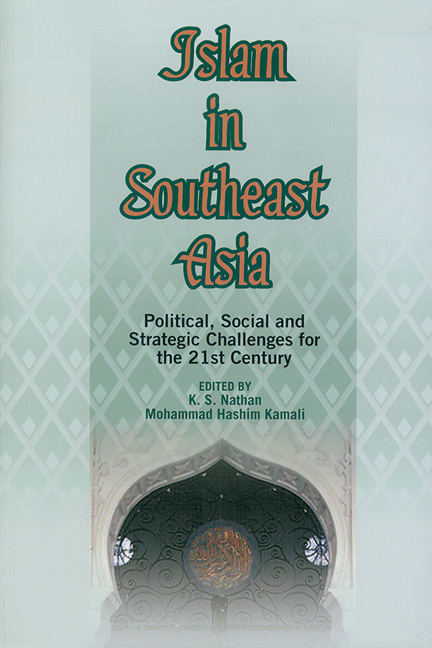Book contents
- Frontmatter
- Contents
- Preface
- Introduction: Understanding Political Islam Post-September 11
- PART ONE ISLAMIC DOCTRINE, HISTORY, GROWTH AND INSTITUTIONS IN SOUTHEAST ASIA
- 1 Islamic Thought: Theory, Concepts, and Doctrines in the Context of Southeast Asian Islam
- 2 The History of Islam in Southeast Asia: Some Questions and Debates
- 3 The Advent and Growth of Islam in the Philippines
- 4 Islamic Economic Institutions in Indonesia: A Religio-Political Perspective
- 5 The Development and Impact of Islamic Economic Institutions: The Malaysian Experience
- PART TWO POLITICS, GOVERNANCE, CIVIL SOCIETY AND GENDER ISSUES IN SOUTHEAST ASIAN ISLAM
- PART THREE MODERNIZATION, GLOBALIZATION AND THE ‘ISLAMIC STATE’ DEBATE IN SOUTHEAST ASIA
- PART FOUR IMPACT OF SEPTEMBER 11 ON ISLAMIC THOUGHT AND PRACTICE
- CONCLUSION: Addressing the Challenge of Political Islam in Southeast Asia
- Note on Contributors
- About the Editors
- Index
4 - Islamic Economic Institutions in Indonesia: A Religio-Political Perspective
from PART ONE - ISLAMIC DOCTRINE, HISTORY, GROWTH AND INSTITUTIONS IN SOUTHEAST ASIA
Published online by Cambridge University Press: 03 November 2017
- Frontmatter
- Contents
- Preface
- Introduction: Understanding Political Islam Post-September 11
- PART ONE ISLAMIC DOCTRINE, HISTORY, GROWTH AND INSTITUTIONS IN SOUTHEAST ASIA
- 1 Islamic Thought: Theory, Concepts, and Doctrines in the Context of Southeast Asian Islam
- 2 The History of Islam in Southeast Asia: Some Questions and Debates
- 3 The Advent and Growth of Islam in the Philippines
- 4 Islamic Economic Institutions in Indonesia: A Religio-Political Perspective
- 5 The Development and Impact of Islamic Economic Institutions: The Malaysian Experience
- PART TWO POLITICS, GOVERNANCE, CIVIL SOCIETY AND GENDER ISSUES IN SOUTHEAST ASIAN ISLAM
- PART THREE MODERNIZATION, GLOBALIZATION AND THE ‘ISLAMIC STATE’ DEBATE IN SOUTHEAST ASIA
- PART FOUR IMPACT OF SEPTEMBER 11 ON ISLAMIC THOUGHT AND PRACTICE
- CONCLUSION: Addressing the Challenge of Political Islam in Southeast Asia
- Note on Contributors
- About the Editors
- Index
Summary
INTRODUCTION
In 1991, an Islamic bank, Bank Muamalat Indonesia (BMI), was founded in Indonesia. In a way, this was a historical landmark considering the fact that the long-overdue project had finally materialized. Muslims in Indonesia had been aspiring to the creation of such an important financial institution since the 1970s. For many of them, the existence of an Islamic bank is a necessity to enable them to perform their religious obligation in the economic field. As widely understood Islam prohibits riba (usury). What constitutes riba, however, is still a debatable subject. Among the fiqh (Islamic jurisprudence) scholars themselves, there has not been a final word regarding the issue. Different opinions and interpretations of riba are still very much in existence. In fact, discussions over the issue tend to develop into a more detailed, complex, and sophisticated manner, covering both the economic as well as religious dimensions. Yet, the likelihood is that Muslims will not come to a single understanding of it in the near future.
Many Indonesian Muslims, like their counterparts throughout the Islamic world, believe that interest is one kind of riba. Thus, in their view, the existence of interest-based financial institutions does not seem to conform to Islamic teachings. A larger part of the Muslims, however, perceive otherwise. As such, they do not consider interest as a form of riba. Therefore, they do not seem to have any theological inconveniences in conducting economic and/or financial transactions with any existing conventional or non-Islamic banks. To make the question of interest more difficult to settle is the presence of the sizeable bulk of Muslims who take a middle stance. They argue that, given the strengths and weaknesses of each differing positions, interest can be identified as mutasyabihat, a legal issue that is not yet clear and therefore must be avoided. At best, they are of the opinion that until the foundation of an Islamically operated financial infrastructure is secured, the existence of a conventional banking system can be accepted as an emergency institution.
The fact that perceptions as to what constitutes riba are by no means unified does not appear to prevent Muslims from establishing Islamic financial institutions.
- Type
- Chapter
- Information
- Islam in Southeast AsiaPolitical, Social and Strategic Challenges for the 21st Century, pp. 64 - 81Publisher: ISEAS–Yusof Ishak InstitutePrint publication year: 2005



